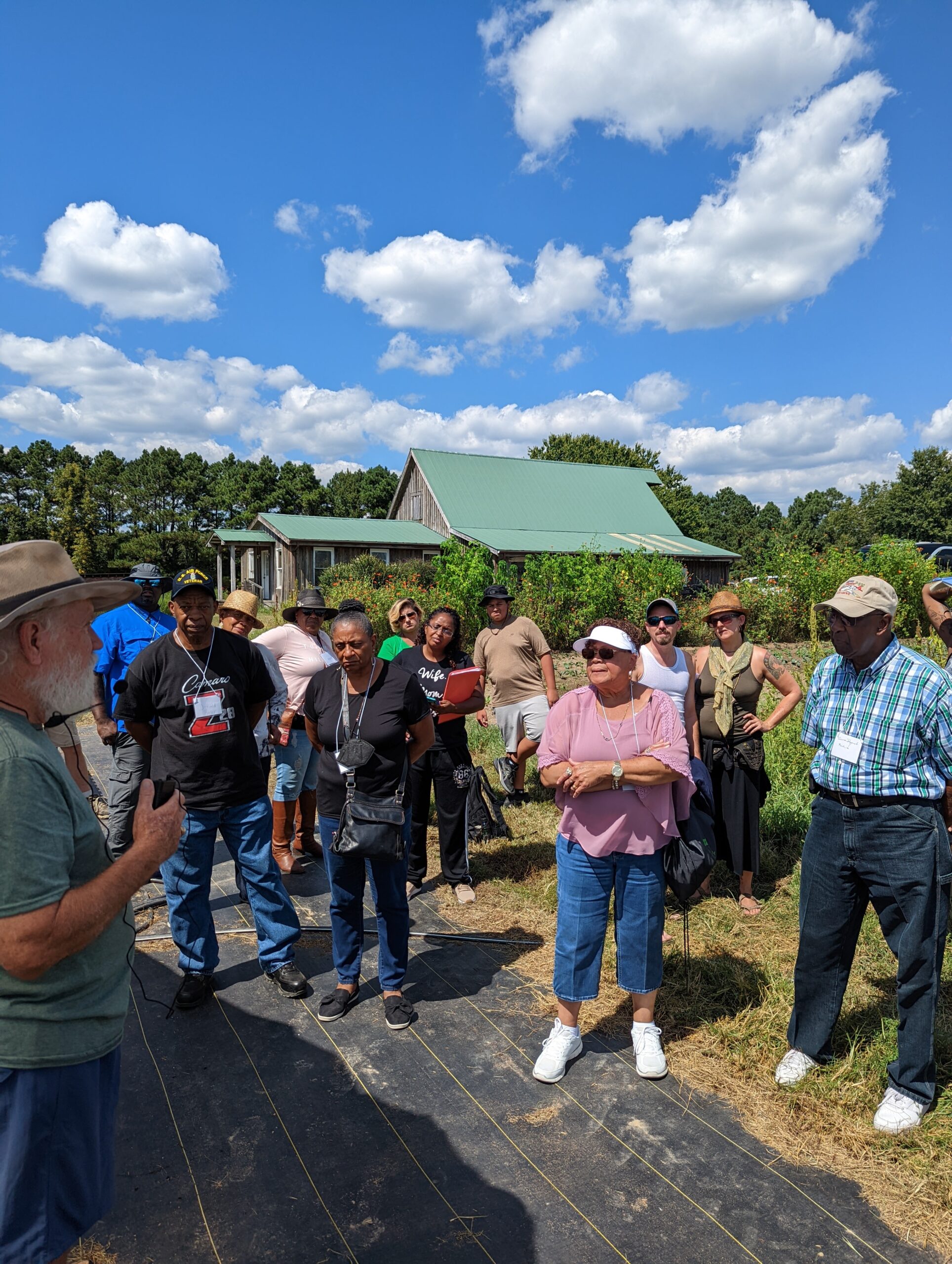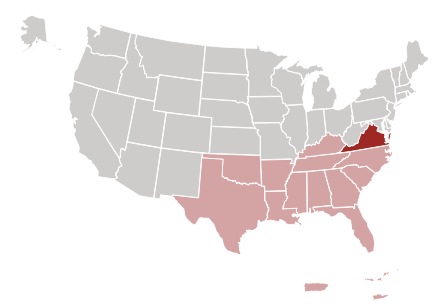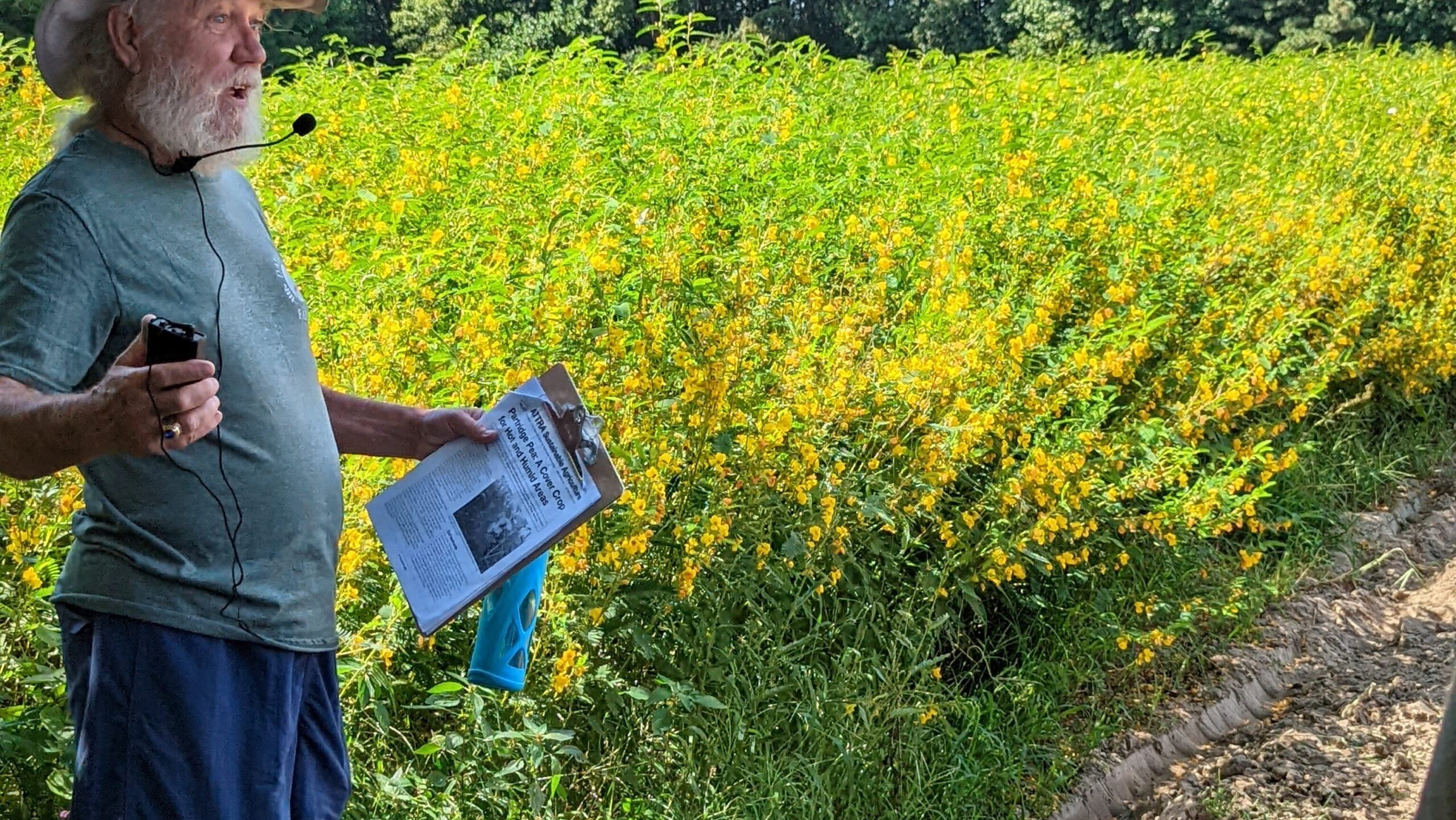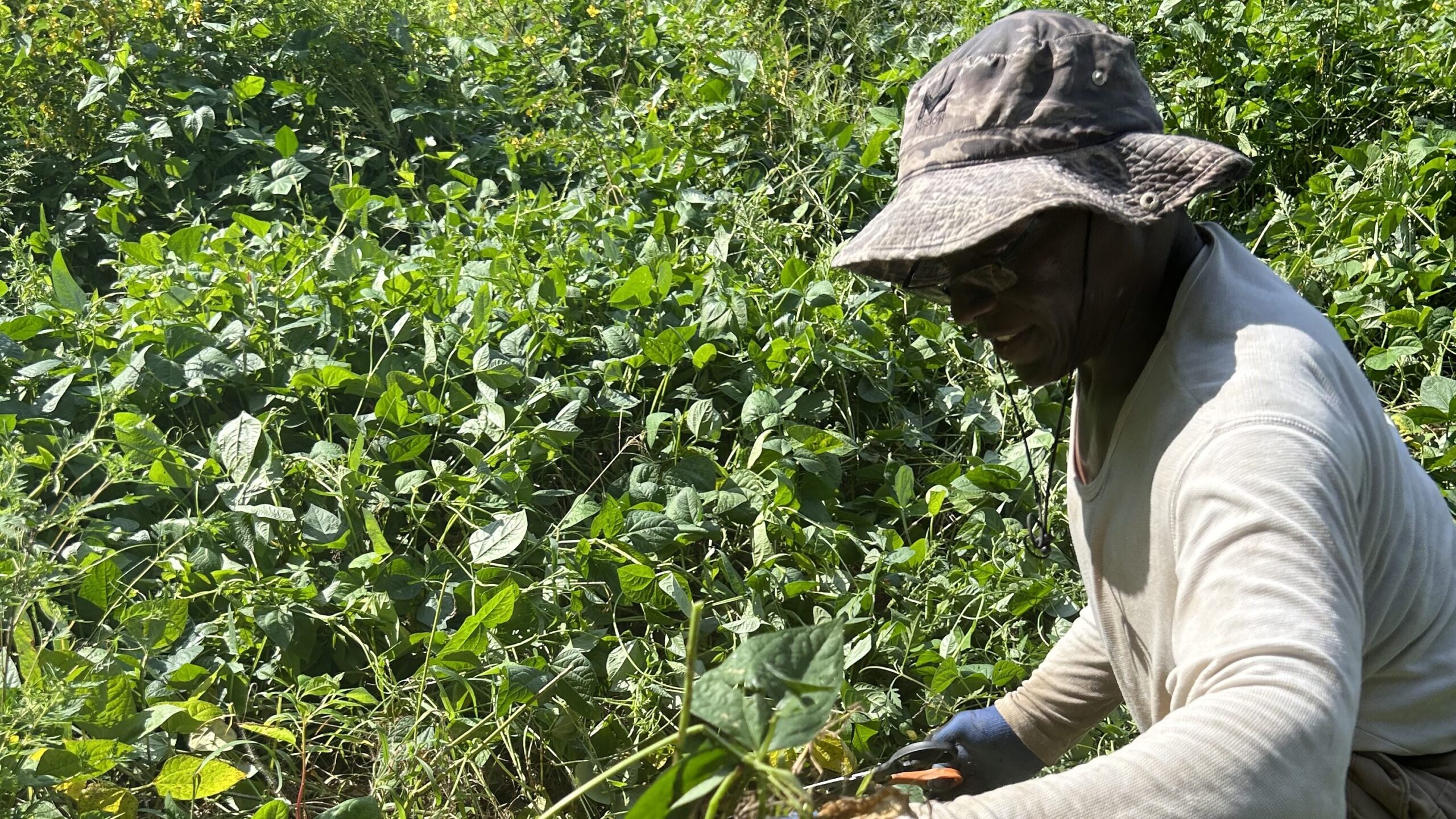
Using chipped wood mulch as a permaculture practice is an economically viable strategy for small fruit and vegetable farmers to manage weeds, increase yield, improve soil health, and reduce irrigation.
Water doesn’t evaporate as fast when the ground is covered with something like mulch; that’s what the wood chips did. Moisture was steady throughout the entire experiment, and we did see an increase in overall production resulting from the use of wood chips.”
—Patrick Johnson, Farmer/Rancher Grantee
Wood Chips Facilitate Crop Production by Limiting Moisture Evaporation

Region: Southern
State: Virginia
Grant Type: Farmer/Rancher
Grant: FS18-308
SARE POST-PROJECT EVALUATION IMPACT MODEL
This evaluation impact model is specific to this SARE-funded project.
Sustainability Impacts
The project grantees and stakeholders contributed to the following sustainability impacts:
- Environmental sustainability impacts
- Economic sustainability impacts
- Social sustainability impacts
- Production efficiency impacts
Grantee Indicators
(Farmer/Rancher)
Project grantees (defined above) achieved sustainability impacts by engaging with the following indicators through involvement with project activities:
- Increased knowledge/skills
- Increased capacity/motivation
- Increased engagement
Stakeholder Indicators
(Farmers, Agricultural Professionals)
Project stakeholders (defined above) achieved sustainability impacts by engaging with the following indicators through involvement with project activities:
- Increased knowledge/skills
- Increased capacity/motivation
- Increased engagement
The Success Story
Patrick Johnson, founder of Neighborly Affiliations for Naturally Idealized Health (NANIH) farm and garden, and Diversity Permaculture education and consulting, is a two-time SARE producer grant recipient. During his first SARE grant term, he made notable strides in demonstrating that locally available, chipped wood mulch is an effective, sustainable agricultural practice in Virginia. Johnson’s research unearthed the benefits of chipped wood mulch for small fruit and vegetable production, offering a non-chemical, economically viable way for small farms to manage weeds. Leveraging the SARE funds, Johnson shared learnings with farmers and agricultural professionals at regional conferences and farmers’ markets about the positive effects of chipped wood mulch and permaculture systems. Notably, Johnson strategically increased access to permaculture knowledge and practices for Black producers through his wide networks and participation in the Black Urban Grower conference. In Johnson’s tireless commitment to sharing permaculture knowledge with Virginians over the last two decades, he has observed a promising shift in the community’s understanding and openness to the benefits permaculture offers. Permaculture has often been dismissed in academic circles and the sustainable agriculture community as not being sufficiently research or science-based, but Johnson’s efforts and the credibility and legitimacy gained through the SARE grant enabled him to change this perception and expand his influence with local farmers, extension professionals, academia, and the wider sustainable agriculture community.
It has helped open doors to people locally seeking more information about sustainable agriculture, specifically permaculture. Even people already involved in agriculture have misconceptions about permaculture. The SARE grant unlocked opportunities to broaden local producers’ horizons and knowledge of sustainable agriculture and permaculture.”
—Patrick Johnson, Farmer/Rancher Grantee

Grantee (Farmer/Rancher) Highlights
Johnson’s background in nonprofit management and as a Peace Corps volunteer, through which he gained experience writing and managing grants, enriched his success as a SARE grantee. During the grant term, Johnson learned the viability of chipped wood mulching as a substitute for cover cropping, a concept not widely promoted in sustainable agriculture. His meticulous research on mulch led Johnson to uncover benefits like those found in cover cropping, such as soil cooling, which enhances crop growth. This paradigm shift challenges conventional agricultural practices and underscores the importance of natural mulch in sustainable agriculture.
Bolstered by the credibility and support of the SARE grant, Johnson successfully engaged his local community and beyond, thereby increasing farmers’ knowledge of permaculture systems. Johnson’s scientific research on the benefits of wood chips in soil management and weed control has been welcomed as scientific validation of what farmers knew anecdotally to be a good practice. Tabling at conferences and local farmers’ markets, and creating YouTube videos on mulching, reached between 500-700 people and amplified Johnson’s reach. As a Virginia State University guest lecturer, Johnson teaches the permaculture section of a sustainable agriculture course, further expanding his influence in academic circles and equipping the next generation of farmers and agricultural professionals with the knowledge and tools to implement permaculture practices. Johnson also shares his expertise through consulting and education services.
Building on the knowledge and experience of his first SARE grant, Johnson secured a second SARE grant (FS22-345) to further his scientific application of sustainable practices for weed control. This time, Johnson is exploring whether native plants, which are often dismissed as weeds, can be grown as beneficial cover crops. Native plants have great potential as they are easier to establish than their non-native counter parts, reducing costs for farmers. In addition to controlling weeds, Johnson has observed positive impacts on crop production. For example, the cover crop partridge peas increases positive microbes and fixes nitrogen, mirroring the benefits found in more conventional methods such as such as applying dehydrated poultry manure.
SARE Grants Open Doors to Promoting Sustainable Practices
Recently I attended a sustainable ag conference in Texas where I was invited to talk to people interested in sustainable agriculture about some of the practices they might want to consider, especially for folks new to implementing sustainable agriculture projects. We also developed publications during the SARE grant that document the permaculture experiment itself.”
—Patrick Johnson, Farmer/Rancher Grantee
Other Stakeholder (Farmers, Agricultural Professionals) Highlights
Johnson prioritizes establishing relationships with farmers in his influencing efforts, gradually introducing permaculture practices supported by scientific findings. He emphasizes the ways these practices positively impact farmers’ bottom line and demonstrates how temporary sacrifices can bring about longer-term benefits. Extension professionals at Virginia State recently invited Johnson to present to farmers using a permaculture demonstration plot, a key example of permaculture gaining traction in mainstream agriculture. Johnson noted that when he moved to Virginia more than 20 years ago, only about 3 in 10 people were aware of what permaculture meant. Now Johnson estimates that knowledge base has doubled to 6 in 10 people. Although changing producer practices is a slow, complex process, Johnson’s commitment to providing scientific justification for permaculture practices, coupled with his robust relationships with farmers and agricultural professionals, is moving the needle.
Recently, I attended a sustainable ag conference in Texas where I was invited to talk to people interested in sustainable agriculture about some of the practices they might want to consider, especially for folks new to implementing sustainable agriculture projects. We also developed publications during the SARE grant that document the permaculture experiment itself.”
—Patrick Johnson, Farmer/Rancher Grantee
SARE Grants Open Doors to Promoting Sustainable Practices

Mulch Significantly Enhances Soil Organic Matter And Increases Resilience to Drought
When I started the SARE project, I had a soil organic matter of about four, which is considered good. But now, because of doing things like using chipped wood mulch, cover cropping, and adding additional organic matter, my soil organic matter is almost 11. With such robust soil organic matter, I haven’t had to face the consequences of not having running water from a well, a pond, or municipal sources during a drought.”
—Patrick Johnson, Farmer/Rancher Grantee
Sustainability Impacts
This SARE project affirms that adopting permaculture practices such as chipped wood mulch contributes to economic, environmental, social sustainability. Permaculture farming practices are climate change resilient as they require very little water and increase soil health while also eliminating the need for pesticides harmful to the ecosystem. Unlike conventional practices like plastic mulch, wood chips improve soil structure, enhance gas transfer, suppress pathogens, and increase water retention and vegetable crop production. Johnson had a higher yield of okra when they were nestled in a bed of local hardwood chip mulch. In fact, Johnson experienced increased crop yields even when plants were irrigated exclusively with rainwater, rather than conventional, resource- intensive irrigation systems.
Johnson’s SARE project also contributes to social sustainability by sharing his research and experience with African American producers, one of several underrepresented minority groups in agriculture. Permaculture is considered indigenous knowledge that has been practiced for thousands of years. Prior to the Great Migration in the early 20th century, wherein African Americans migrated to predominantly urban areas in the north to escape segregation and sharecropping in the southern states, African American farmers were implementing permaculture principles. Over time, however, there has been a tremendous loss of African American farms. Restoring permaculture practices in African American communities, particularly in urban agriculture settings, is a practice in diversity, equity and inclusion and reclaiming lost agricultural knowledge due to systemic oppression. Johnson noted that many African American individuals own heir property—-land inherited from older generations and often jointly held by several family members—-and they have expressed a desire to better steward the land. Johnson is addressing this desire to “move back to the land in both urban and rural settings” by bringing together community and “holistic permaculture practices that save the planet,” offering permaculture as “ecological landscape design.”

